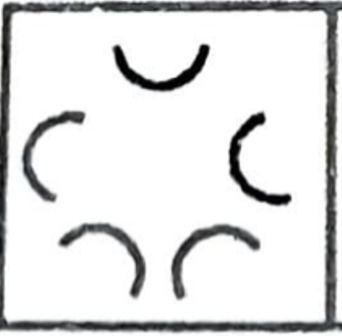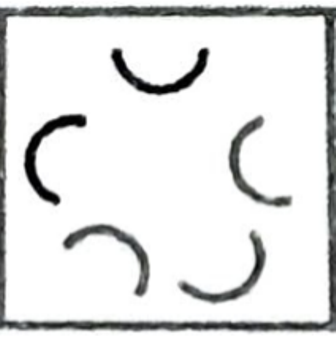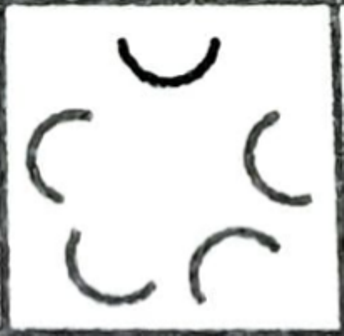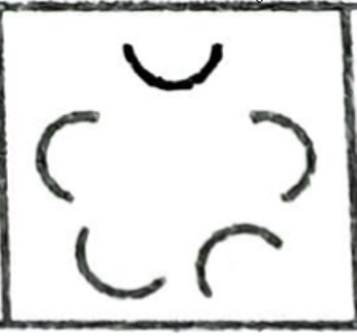Non Verbal Series Five Figures
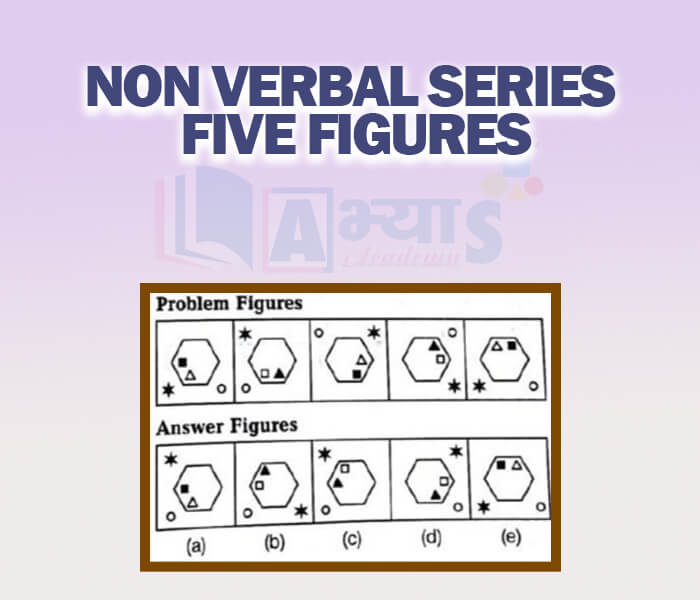
Non Verbal Series - Five Figures
Non-Verbal Series: It consists a series of figures which change according to a fixed logical pattern as we go from one figure to the next. The candidate is identify the pattern and then choose the figure from the options which would be the next to continue the same pattern. Let us consider a few examples to clarify the things.
Five Figure Series: This types of problems on series consists of five figures forming the set of Problem figures, followed by four other figures forming the set of Answer Figures . The five consecutive Problem Figures form a definite sequence and the candidate is required to select one of the figures from the set of Answer Figures which will continue the same sequence.
Illustration: The problem figures consists of five figures. Find out which one of the options continue the same series as established by the five problem figures.

|
A |
B |
C |
D |
Answer : A
Solution: On analysing the question figure we find that the arcs are being inverted in the sequence of one, two, three, one, two, three, .... This inversion takes place in an anti clockwise direction.
The figure so obtained is given in option A.
Hence option A is the correct answer.
Illustration: The problem figures consists of five figures. Find out which one of the options continue the same series as established by the five problem figures.

|
A |
B |
C |
D |
Answer: D.
Solution: On analysing the question figure we find that one slanting line is added as we move from one figure to another
Figure in option D satisfies this condition.Hence D is the correct option.
Identify and choose the correct pattern or figure that will complete the large square.
| |||
| Right Option : C | |||
| View Explanation | |||
Directions : Each of the following questions consists of five figures marked A, B C, D and E called the Problem Figures followed by answer figures. Select a figure from amongst the Answer Figures which will continue the same series as established by the five problem figures.
| |||
| Right Option : C | |||
| View Explanation | |||
Directions : Each of the following questions consists of five figures markes A, B C, D and E called the Problem Figures by fivve other figures marked 1,2, 3, 4, and 5 called the answer figures. Select a figure from amongst the Answer Figures which will continue the same series as established by the five problem figures.
| |||
| Right Option : D | |||
| View Explanation | |||
Students / Parents Reviews [20]
Abhyas academy is great place to learn. I have learnt a lot here they have finished my fear of not answering.It has created a habit of self studying in me.The teachers here are very supportive and helpful. Earlier my maths and science was good but now it has been much better than before.

Barkha Arora
10thMy experience with Abhyas academy is very good. I did not think that my every subject coming here will be so strong. The main thing is that the online tests had made me learn here more things.

Hiya Gupta
8thThe experience was nice. I studied here for three years and saw a tremendous change in myself. I started liking subjects like English and SST which earlier I ran from. Extra knowledge gave me confidence to overcome competitive exams. One of the best institutes for secondary education.

Aman Kumar Shrivastava
10thIn terms of methodology I want to say that institute provides expert guidence and results oriented monitering supplements by requsite study material along with regular tests which help the students to improve their education skills.The techniques of providing education helps the students to asses...

Aman Kumar Shrivastava
10thWe started with lot of hope that Abhyas will help in better understnding of complex topics of highers classes. we are not disappointed with the progress our child has made after attending Abhyas. Though need to mention that we expected a lot more. On a scale of 1-10, we would give may be 7.

Manya
8thMy experience with Abhyas Academy has been very good. When I was not in Abhyas whenever teacher ask questions I could not speak it confidently but when I came in Abhyas, my speaking skills developed and now I am the first one to give the answer of teachers question.

Upmanyu Sharma
7thOne of the best institutes to develope a child interest in studies.Provides SST and English knowledge also unlike other institutes. Teachers are co operative and friendly online tests andPPT develope practical knowledge also.

Aman Kumar Shrivastava
10thAbhyas Methodology is very good. It is based on according to student and each child manages accordingly to its properly. Methodology has improved the abilities of students to shine them in future.

Manish Kumar
10thMy experience with Abhyas is very good. I have learnt many things here like vedic maths and reasoning also. Teachers here first take our doubts and then there are assignments to verify our weak points.

Shivam Rana
7thAbhyas institute is one of the best coaching institute in the vicinity of Ambala Cantt area. The teachers of the institute are well experienced and very helpful in solving the problems of the students.The good thing of the institute is that it is providing extra classes for the students who are w...

Aman Kumar Shrivastava
10thIt was good as the experience because as we had come here we had been improved in a such envirnment created here.Extra is taught which is beneficial for future.

Eshan Arora
8thA marvelous experience with Abhyas. I am glad to share that my ward has achieved more than enough at the Ambala ABHYAS centre. Years have passed on and more and more he has gained. May the centre flourish and develop day by day by the grace of God.

Archit Segal
7thAbhyas is an institute of high repute. Yogansh has taken admission last year. It creates abilities in child to prepare for competitive exams. Students are motivated by living prizes on basis of performance in Abhyas exams. He is satisfied with institute.

Yogansh Nyasi
7thIt has a great methodology. Students here can get analysis to their test quickly.We can learn easily through PPTs and the testing methods are good. We know that where we have to practice

Barkha Arora
10thI have spent a wonderful time in Abhyas academy. It has made my reasoning more apt, English more stronger and Maths an interesting subject for me. It has given me a habbit of self studying

Yatharthi Sharma
10thBeing a parent, I saw my daughter improvement in her studies by seeing a good result in all day to day compititive exam TMO, NSO, IEO etc and as well as studies. I have got a fruitful result from my daughter.

Prisha Gupta
8thAbout Abhyas metholodology the teachers are very nice and hardworking toward students.The Centre Head Mrs Anu Sethi is also a brilliant teacher.Abhyas has taught me how to overcome problems and has always taken my doubts and suppoeted me.

Shreya Shrivastava
8thMy experience with Abhyas academy is very nice or it can be said wonderful. I have been studying here from seven class. I have been completing my journey of three years. I am tinking that I should join Abhyas Academy in tenth class as I am seeing much improvement in Maths and English

Hridey Preet
9thAbhyas is good institution and a innovative institute also. It is a good platform of beginners.Due to Abhyas,he has got knoweledge about reasoning and confidence.My son has improved his vocabulary because of Abhyas.Teacher have very friendly atmosphere also.

Manish Kumar
10thAbhyas institute is one of the best coaching institute in the vicinity of Ambala cantt.The institute provides good and quality education to the students.The teachers are well experienced and are very helpful in solving the problems. The major advantages of the institute is extra classes for weak...



